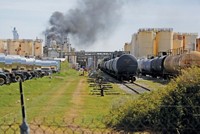Advertisement
Grab your lab coat. Let's get started
Welcome!
Welcome!
Create an account below to get 6 C&EN articles per month, receive newsletters and more - all free.
It seems this is your first time logging in online. Please enter the following information to continue.
As an ACS member you automatically get access to this site. All we need is few more details to create your reading experience.
Not you? Sign in with a different account.
Not you? Sign in with a different account.
ERROR 1
ERROR 1
ERROR 2
ERROR 2
ERROR 2
ERROR 2
ERROR 2
Password and Confirm password must match.
If you have an ACS member number, please enter it here so we can link this account to your membership. (optional)
ERROR 2
ACS values your privacy. By submitting your information, you are gaining access to C&EN and subscribing to our weekly newsletter. We use the information you provide to make your reading experience better, and we will never sell your data to third party members.
Environment
Government Concentrates
July 18, 2005
| A version of this story appeared in
Volume 83, Issue 29
Senate Democrats introduced legislation last week that would require chemical manufacturers to provide EPA with basic health and safety information on chemicals used in consumer products. The bill would fundamentally overhaul the nation's chemical management framework and is similar to proposed reforms in the European Union. "Most Americans believe their government is making sure that chemicals used in the marketplace are safe. Unfortunately, that simply isn't true," Sen. Frank R. Lautenberg (D-N.J.) remarked at a Capitol Hill news conference. Lautenberg said the measure he is sponsoring with Sen. James M. Jeffords (I-Vt.) was prompted by a growing body of research in peer-reviewed scientific journals documenting serious health effects from chemicals in common consumer products, such as bisphenol-A in baby bottles and phthalates in toys and cosmetics. Under the legislation, chemical makers would first provide data on a range of health effects. EPA would then prioritize the chemicals for review to ensure they meet a health standard that is protective of children and fetuses. Chemicals that fail to meet the standard could be banned or restricted to certain essential uses. By 2020, all chemicals in commerce would need to meet the standard. Lautenberg also released a Government Accountability Office report (GAO-05-458) that advises Congress to amend the Toxic Substances Control Act to give EPA more authority to obtain the data needed to evaluate chemical safety.
Members of two panels, speaking to the Senate Committee on Homeland Security & Government Affairs last week, voiced wildly different views on chemical plant security needs. The hearing was one of several intended to guide senators in drafting a bill to protect chemical plants from terrorists. Representatives of three chemical trade associations urged that a national bill recognize their voluntary programs as models; opposed inherent safer design requirements; and supported a flexible, risk-based, and tiered system that would not threaten profitability. They also said they were well-prepared for plant emergencies no matter the cause and stressed support for national legislation, noting that states were enacting their own individual laws. A second panel of union and government accident investigators and an environmental group representative, however, cited examples of security failures at trade association member companies that had allowed unauthorized access to plant facilities or had failed to adequately respond to a real chemical accident. They stressed that a federal plant security program should set higher standards than the current industry-run programs and should encourage plant safety and better emergency response efforts. Senators plan to draw up legislation by September and have been promised help from the Department of Homeland Security, which has not been received, said Sen. Joseph I. Lieberman (D-Conn.).
NIH's National Center for Research Resources (NCRR) announced last week that it will fund 11 High-End Instrumentation grants at 10 research institutions totaling approximately $18 million. "Rapid technological development has led to a new generation of high-sensitivity, high-resolution instruments that are very expensive but that can greatly accelerate research into the underlying mechanism of disease," said Barbara Alving, NCRR's acting director. Examples of the instrumentation covered by these grants include macromolecular NMR spectrometers, high-resolution mass spectrometers, and electron microscopes. To qualify for the grant, institutions had both to identify at least three NIH-funded investigators whose work requires the equipment and to provide any necessary infrastructure.
The federal agency that monitors natural gas pipeline safety is looking into claims by Washington Gas Light Co. that the chemical composition of liquefied natural gas (LNG) supplied by Dominion Resources Inc. was a "key contributing factor" to an unusual rash of gas leaks in parts of Prince George's County, Md., over the past two years. Damon Hill, a spokesman for the Transportation Department's Office of Pipeline Safety, says it will determine what, if any, steps should be taken to avoid further leaks in other pipeline systems with similar equipment. A consultant's report commissioned by Washington Gas concluded that three factors--aging materials, cold weather, and gas composition--contributed to the deterioration of rubber seals in gas pipeline couplings and the resultant leaks. The affected area in Maryland was unique in receiving natural gas from Dominion's LNG terminal at Cove Point, Md. Compared with pipeline natural gas from other sources, the gas contains less pentane and heavier hydrocarbons because of the liquefaction process and can have a drying effect on rubber, the report concluded. Dominion disputes Washington Gas's claim, saying that the aging pipe couplings, not gas composition, were to blame for the leaks.
◾ EPA has issued a final rule revising Toxics Release Inventory (TRI) reporting requirements. In a July 12 Federal Register notice, EPA said changes in TRI reporting forms would reduce time and cost burdens, saving industry about $2.26 million annually.
◾ Secretary of Homeland Security Michael Chertoff has announced a major restructuring of his department that includes no changes to the Science & Technology Directorate. The Information Analysis & Infrastructure Directorate will now be called the Directorate for Preparedness. It will include an assistant secretary for infrastructure protection and a new chief medical officer responsible for coordinating the response to biological attacks and for liaising with the Department of Health & Human Services, the Centers for Disease Control & Prevention, and NIH.
◾ The Department of Defense says there is a link between exposure to agent orange in Vietnam veterans and adult-onset diabetes. This latest result from the Air Force Health Study concludes the 20-year long epidemiological study.




Join the conversation
Contact the reporter
Submit a Letter to the Editor for publication
Engage with us on Twitter